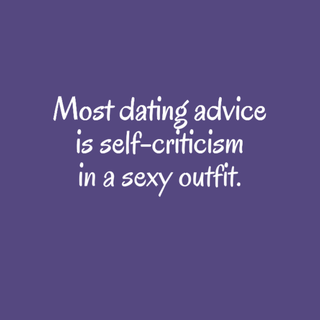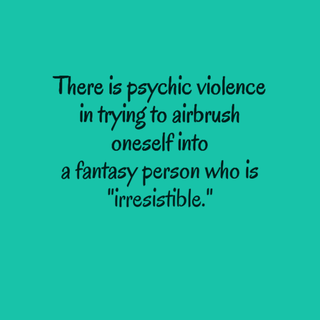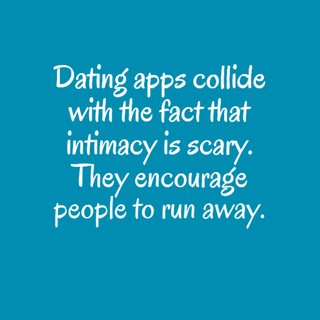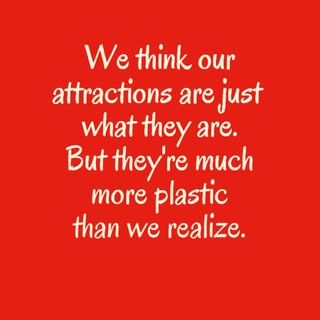Mating
Everything You Know About Dating Is Probably Wrong
Dating is really an inside game, but most approach it from the outside in.
Posted August 13, 2018
The search for love is one of the most important activities we engage in. Nothing expresses our humanity more than the need for deep connection. And few things matter more to our health and happiness—even our sense of self—than our choice of life partner.
Yet so often the search itself is a bruising experience. What should be a trial-and-error process in which we learn as much about ourselves as we do about another person becomes an ordeal. Why is that?
Almost everything we’ve learned about dating is wrong, contends psychotherapist Ken Page, author of Deeper Dating: How to Drop the Games of Seduction and Discover the Power of Intimacy. “Dating is an inner game,” he says, but instead of searching from the inside out, we’ve been taught to approach it from the outside in, to accommodate ourselves to the mating market by making ourselves into something we’re not. No wonder so many people are yearning for “authenticity.”
I recently sat down with Page to discuss dating in the 21st century.

HEM: What do you mean by inner dating?
KP: The inner game of dating is an inside-out approach. It recognizes that the fire of real intimacy starts from authenticity, not from fixing yourself from the outside in. The outside-in approach is misleading and damaging although it is recommended by most dating advice, which asks people to make themselves more attractive.
HEM: Right, how do you accommodate yourself to what the possibilities are out there—and turn yourself into something you may not be.
KP: Make yourself more “desirable.” The hidden message is “make yourself a more attractive you.” That may sound like it’s advocating self-improvement, but it’s really self-criticism in a sexy outfit.
HEM: Don’t we have to navigate a course through life based on feedback from the world we’re in?
KP: Absolutely. But if your first question is, What’s wrong with me now and how can I fix myself? you will cripple all future interactions. The first question should be, What do I feel? What do I experience? What is authentic for me? And then there is a back-and-forth process.
HEM: Not just What is authentic for me? but also What will help me grow, be the self that I am hopefully moving towards?
KP: Yes. There is a self-liking in that. It changes the direction your dating life goes in. There’s nothing wrong with self-improvement, but if you start from How do I fix what’s wrong with me? you create a cycle of insecurity-based behaviors, which always leads to bad things.
HEM: There is always a tug-of-war with life, not just in the dating realm but in every domain. Do I lead with my strengths or do I devote my time to remedying my weaknesses? I think people get much further by taking the résumé approach: On your résumé you don’t write I’m a jerk or I was fired from my last job. You summarize your strengths and lead with them.

KP: Absolutely, although the danger in focusing too much on your strengths is it can turn you into an airbrushed version of yourself. Often, what we regard as our weaknesses and flaws are in fact our greatest strength. The parts of ourselves that we often feel embarrassed about or are timid to reveal are the parts that people are going to love the most. But we’ve been hurt, misunderstood, or taken advantage of in those places, so we haven’t learned to honor those qualities, which are our humanness. When we lead with our humanity, that’s when things really start to change. Of course there has to be an adult self that orchestrates that, but there is an essential dignifying of the human part of us; instead of trying to airbrush ourselves into an "irresistible" fantasy person. That is the psychic violence created by so much dating advice.
HEM: As psychologist Steven Hayes says, very succinctly, “We hurt where we care.”
KP: I call those place our core gifts. We find them by asking ourselves two questions:. What gives me the most joy and the most meaning in my relationships? And What hurts me and causes me pain and makes me shut down? Most of us minimize or dismiss those points of deepest meaning; we don’t honor or cultivate them enough in our relationships. And of the places of our sensitivity, where we get most easily hurt, we tend to tell ourselves, Oh, you’re just being too sensitive.
HEM: Why do we do that?
KP: Because we human beings are in some ways breathtakingly sensitive. The closer we get to the core of who we are–art understands that, literature understands that, psychotherapy understands that, but dating advice doesn’t—the more vulnerable we feel; the riskier intimacy gets. But also the more alive it gets. Conventional dating advice says, Toughen up. Act confident. The further you get from the center of your authentic self, the more airbrushed and defended you are.
HEM: You talk about the damage that dating advice does. I’d like to add a bad word for the damage that today’s dating websites do–all of them, although Tinder might be the worst. The fact of dating by app changes our very perception of who’s out there and what’s waiting for us. It affects people internally, weakening the desire for commitment because the perfect person for you—your mythical soulmate—is just the next click away. That’s a function of the vast pool of people online.

KP: And it ignores the fact that getting intimate is scary. It’s easy to look for the next one. There’s a point of fear that we have to get through, a point of awkwardness and discomfort. The impulse is to run away. The apps encourage you to run away. Also, the apps speed the process, and speed is the enemy of intimacy. The search for love is one of the most essential missions of adult life. The research is clear: Almost nothing affects the quality of our existence more than our choice of partner and our ability to sustain the relationship.
HEM: What got you interested in looking at this so carefully?
KP: I was such a failure at dating for so long. The outer approach never worked for me. I was most ashamed of my deep sensitivity. It translated into softness and, as a child of Holocaust survivors, i knew that softness meant death. I was ashamed of those qualities in myself. But they're my most essential qualities. When we don't know how to dignify the tender parts of ourselves, we make bad choices again and again and become sexually and romantically attracted to those who also can't dignify them. I spent years trying to be tough enough and going after the tough guys. It was hell. I always ended up with unavailable guys whom I admired because of their toughness but who were just not that interested in me. As I began to dignify those sensitive parts of myself I started getting attracted to nicer guys and—miracle of miracles—I found that they were attracted to me. When we make that inner shift, the field shifts.
HEM: Could you articulate it more, because that's really what this is about.
KP: The dating advice essentially says, Put some makeup on, get those glutes, get those abs, make that false self look great and irresistible. When we instead say, What are the parts of myself that are the most tender, the most precious, we gain dignity and passion. No one is taught to date that way.
HEM: No. What that requires is, in a sense, particularizing yourself. That individualizes you. Sure, you are most authentic and passionate, but that carries the theoretical risk that you are going to narrow the field of choices beyond the possibility of finding a mate. You’ll unicorn your way out of the dating world.
KP: That is the primitive fear. But if you try to be something you're not, then you're going to meet someone who is attracted to someone you’re not. But you can only hold in your stomach in for so long. You need to start dating by asking yourself, With whom do I feel safe in a deep way? With whom do I feel right? Of course, a lot more questions come afterwards–How sexually attracted am I, How compatible are we? But if your first question is, With whom do I feel a deep sense of rightness and safety? you can build a home in the world. Another thing happens: Even though you are narrowing the field, you’re saving a breathtaking amount of time.
HEM: As an advice columnist, I hear directly and anecdotally much complaining that the dating experience feels qualitatively abysmal and quantitatively greater.
KP: There’s been an explosion of dating apps, yet the number of single people continues to grow. Anyone engaging in online dating has to carve a unique path. You have to search for deeper shared values, and you have to display that in your profile. Ninety-five percent of people you meet will not be a match for you. That's good news.
HEM: Yes. And even if you are enlightened, you're meeting people who are coming at this with their insecurities, their fear of intimacy—
KP: —and the ways they've been sculpted by society to behave pretty badly online. And women are taught to dumb themselves down so as to not in any way rub the alpha male ego the wrong way or make him feel that he’s not male enough or powerful enough.
HEM: You talk about the dating field shifting when people shift to an inside-out approach. How does that happen?
KP: I came to understand that most of us have two different sets of romantic circuitry and they work differently. We have attractions of deprivation and attractions of inspiration.
HEM: I’ll amend that. Needs that arise from a sense of lack, and needs that arise from a desire to grow, are not exclusively romantic. They apply in all domains of life. There are the needs that come from deprivation—the need for security, the need for acceptance. And then there are growth needs, the ones that expand us, inspire us.

KP: Absolutely. When you start with thinking that who you are is not good enough, you will be sexually and romantically attracted to people from whom you will be constantly seeking the love and approval of those facets of yourself that they will never love. The corollary is, when you lead with the parts of yourself that seem too different, too unique, too powerful, your sexual and romantic attractions actually begin to change. You wind up having no interest in those who don’t “get it.” It doesn’t happen overnight, but the field shifts.
We think that our sexual and romantic attractions are just what they are. But in fact, they're much more plastic than we realize. As we change and dignify those tender parts we were once ashamed to show, our sexual and romantic attractions begin to change. We become more vivid as to who we are, hence more noticed.
HEM: When you’re focused on what you have, that‘s what becomes salient—it’s what you pay attention to. You don’t even notice the others. Research on romance and commitment shows that one essential element in good relationships is the automatic screening out of anyone or anything else. It’s as if you look at he world through a lens of love. You don't even see the other people hitting on you or wanting you. You're just focused on what you have.
KP: When you're doing it the wiser way, you’re leading with who you are: I’m going to be gracious, I'm going to be a warm human being. And then you watch to see who values you back, who is conducting a life based on decency and goodness and really likes what they see when they see you. That's the wiser way. and it’s an existentially brave act, versus the way we are taught: Who am I attracted to? and Do they like me? And How do I get them to like me? That’s the difference between attractions of inspiration and attractions of deprivation.
When you make the choice to lead with your full heart, the field shifts; you start noticing and meeting people who are kinder, more available, and more interested. Psychologist Eli Finkel talks about the principle of instrumentality. When you have a goal, you especially notice and are attracted to people who meet that goal. There’s something else that people don't realize—that if you're not growing as a person through your dating life, growing in good ways, then you're dating wrong. Because the skills of dating are the skills of intimacy.
HEM: Yes, they’re the skills of intimacy—but they’re the skills of living, really, just applied in a very specific domain. The sad part is that people are taught that it's something apart.
KP: Yes. So, basically, the concept is, I'm not going to share these precious gifts in myself—
HEM: —right, I'm going to snare the person, get married— and then I'll take the girdle off.
KP: And, of course, if you’re doing that, you’re going to choose the wrong person. You’ll be unhappy. I can't tell you how many women are terrified that if they're too authentic, they won't be feminine enough. The minute you choose a gender stereotype over authenticity, there's going to be a problem.
HEM: Oh, yes, that’s another one of the ways that people tailor themselves for the mating market. Why aren't we ever taught that dating is an inner game?
KP: The closer a person gets to their core, the riskier it is, the greater the vulnerability they feel. It’s hard stuff to handle. People want the easier way.
HEM: And there are powerful commercial interests that divert people away from the inner approach. But that’s not just on dating, it's on any inner game of any kind. Still, the commercial interests are latecomers to the game; they’re certainly not why it began.
KP: What do you think?
HEM: In part, I think it's because relationships themselves have changed, in that they were once themselves more outer—two generations ago they were much more an enactment of roles that were culturally dictated. Our parents did not expect the degree of compatibility and intimacy that we uniformly do. As we've moved away from relationships defined by rigid roles, life itself has moved more toward an inner game. You don't go into banking as a career because your father was a banker. You seek your passion in work, what lights your inner fire.
KP: So we're fledglings at the inner game, and these are part of the birth pains? That makes sense.
HEM: And you, with your book Deeper Dating and ongoing work, and the Eli Finkels of the world are helping to write the new rules.
Facebook Image: Asier Romero/Shutterstock




